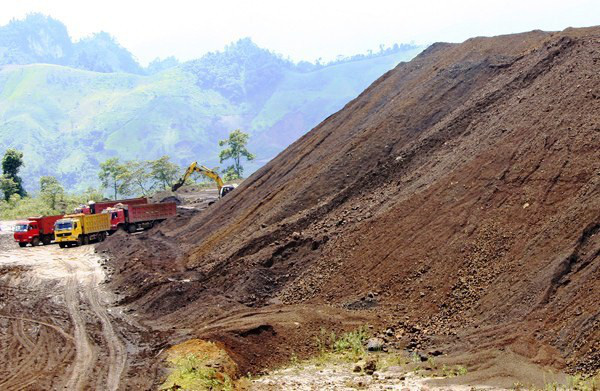Areas banned from mineral activities in Vietnam
What are the areas banned or temporarily banned from mineral activities in Vietnam? - Mr. Duy (Tay Ninh)

Areas banned from mineral activities in Vietnam (Internet image)
Regarding this issue, LawNet would like to answer as follows:
1. Areas banned from mineral activities in Vietnam
According to Clause 1, Article 28 of the Mineral Law 2010, areas banned from mineral activities include:
- Land areas with historical-cultural relics or scenic places already ranked or delimited for protection under the Law on Cultural Heritages;
- Land areas under special-use forests, protection forests or land areas planned for protection forests and geological conservation zones;
- Land areas which are planned for national defense or security purposes or in which mineral activities may affect the performance of defense or security tasks;
- Land areas used by religious institutions;
- Land areas within the protection corridors or zones of transport, irrigation or dike works; water supply and drainage and waste treatment systems, electricity transmission lines, petrol, oil or gas pipelines or communications systems.
2. Areas temporarily banned from mineral activities in Vietnam
According to Clause 2, Article 28 of the Mineral Law 2010, areas temporarily banned from mineral activities shall be delimited for any of the following reasons:
- Satisfying defense or security requirements;
- Conserving the nature, historical-cultural relics or scenic places which are considered by the State for recognition or discovered in the process of mineral exploration or mining;
- To prevent or remedy consequences of natural disasters.
3. Benefits of localities and people in areas in which minerals are exploited in Vietnam
Benefits of localities and people in areas in which minerals are exploited according to Article 5 of the Mineral Law 2010 are as follows:
- The State shall allocate part of revenues from mineral mining activities to support socio-economic development in localities in which minerals are exploited under the state budget law.
- Mining organizations and individuals shall:
+ Partially cover investment costs for upgrading, maintaining and building technical infrastructure facilities used in mining activities and building welfare works under law for localities in which minerals are exploited;
+ Combine mining activities with the building of technical infrastructure and environmental protection and restoration under investment projects on mineral mining; and repair, maintain or build new facilities or pay compensations under law depending on the degree of damage, if causing damage to technical infrastructure facilities or other works and properties;
+ Give priority to employment of local labor in mining activities and related services;
+ Coordinate with local administrations in assuring the change of jobs for local people whose land is recovered for mining.
- Compensation, support and resettlement for land users whose land is recovered for mineral mining projects comply with the land law and other relevant regulations.
4. Rights and obligations of organizations conducting geological baseline surveys of minerals in Vietnam
Rights and obligations of organizations conducting geological baseline surveys of minerals according to Article 23 of the Mineral Law 2010 are as follows:
- Organizations conducting geological baseline surveys have the following rights:
+ To conduct geological baseline surveys of minerals under projects approved by competent state management agencies;
+ To send out of areas in which geological baseline surveys of mineral are conducted, even out of the country, mineral specimens of appropriate weights and types for analysis and testing purposes under the approved projects.
- Organizations conducting geological baseline surveys of minerals have the following obligations:
+ To register geological baseline surveys of minerals with competent state management agencies before conducting these surveys;
+ To properly implement approved projects and comply with standards, technical regulations, norms and unit prices in the process of conducting geological baseline surveys of minerals;
+ To ensure the truthfulness and completeness in the collection and summarization of geological and mineral-related documents and information; to refrain from disclosing geological and mineral-related information during the process of conducting geological baseline surveys of minerals;
+ To protect the environment, minerals and other natural resources during survey periods;
+ To propose competent state management agencies to approve reports on the results of geological baseline surveys of minerals;
+ To submit approved reports on the results of geological baseline surveys of minerals for archival according to the law on archives; to send geological and mineral specimens to the Geology Museum according to the Ministry of Natural Resources and Environment's regulations.
- Key word:
- mineral activities
- in Vietnam
- Cases of land rent exemption and reduction under the latest regulations in Vietnam
- Economic infrastructure and social infrastructure system in Thu Duc City, Ho Chi Minh City
- Regulations on ordination with foreign elements in religious organizations in Vietnam
- Increase land compensation prices in Vietnam from January 1, 2026
- Determination of land compensation levels for damage during land requisition process in Vietnam
- Who is permitted to purchase social housing according to latest regulations in Vietnam?
-

- Emergency response and search and rescue organizations ...
- 10:29, 11/09/2024
-

- Handling of the acceptance results of ministerial ...
- 09:30, 11/09/2024
-

- Guidance on unexploded ordnance investigation ...
- 18:30, 09/09/2024
-

- Sources of the National database on construction ...
- 16:37, 09/09/2024
-

- General regulations on the implementation of administrative ...
- 11:30, 09/09/2024
-

- Notable new policies of Vietnam effective as of ...
- 16:26, 11/04/2025
-
.Medium.png)
- Notable documents of Vietnam in the previous week ...
- 16:21, 11/04/2025
-
.Medium.png)
- Notable documents of Vietnam in the previous week ...
- 16:11, 02/04/2025
-
.Medium.png)
- Notable new policies of Vietnam to be effective ...
- 16:04, 02/04/2025
-
.Medium.png)
- Notable new policies of Vietnam effective from ...
- 14:51, 21/03/2025

 Article table of contents
Article table of contents
